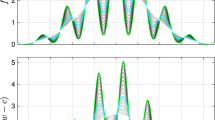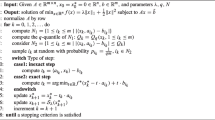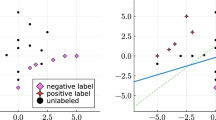Abstract
This paper addresses the multiple measurement vector problem, which aims at recovering jointly sparse vectors from incomplete measurements. Inspired by MUSIC (MUltiple SIgnal Classification) and the greedy algorithms used in compressed sensing, we propose an empirical algorithm, called orthogonal greedy MUSIC (OG-MUSIC), for solving the problem. The proposed algorithm is a greedy algorithm, and a MUSIC procedure and an orthogonal projection operation are applied in each iteration. Since MUSIC is used in each iteration, multiple support elements may be selected per iteration; this is one of the main advantages of OG-MUSIC. The other main advantage of OG-MUSIC is the pruning technique, which is used to find the exact row support when the merged support size is larger than the sparsity level. Theoretical analysis and simulation results illustrate that OG-MUSIC has a very good recovery performance while maintaining a relatively low computational cost.







Similar content being viewed by others
References
E.J. Candès, Y.C. Eldar, D. Needell, P. Randall, Compressed sensing with coherent and redundant dictionaries. Appl. Comput. Harmon. Anal. 31(1), 489–509 (2011)
J. Chen, X.M. Huo, Theoretical results on sparse representations of multiple-measurement vectors. IEEE Trans. Signal Process. 54(12), 4634–4643 (2006)
S.F. Cotter, B.D. Rao, K. Engan, K. Kreutz-Delgado, Sparse solution to linear inverse problems with multiple measurement vectors. IEEE Trans. Signal Process. 53(7), 2477–2488 (2005)
W. Dai, O. Milenkovic, Subspace pursuit for compressive sensing signal reconstruction. IEEE Trans. Inf. Theory 55(5), 2230–2249 (2009)
M.E. Davies, Y.C. Eldar, Rank awareness for joint sparse recovery. IEEE Trans. Inf. Theory 58(2), 1135–1146 (2012)
D.L. Donoho, Compressed sensing. IEEE Trans. Inf. Theory 52(4), 1289–1306 (2006)
P. Feng, Universal minimum-rate sampling and spectrum-blind reconstruction for multiband signals. Ph.D. dissertation, Univ. of Illinois, Urbana-Champaign, IL (1997)
G.H. Golub, C.F. VanLoan, Matrix Computations, 3rd edn. (The Johns Hopkins University Press, Baltimore, 2007)
J.M. Kim, O.K. Lee, J.C. Ye, Compressive MUSIC: revisiting the link between compressive sensing and array signal processing. IEEE Trans. Inf. Theory 58(1), 278–301 (2012)
K. Lee, Y. Bresler, M. Junge, Subspace methods for joint sparse recovery. IEEE Trans. Inf. Theory 58(6), 3613–3641 (2012)
D. Malioutov, M. Cetin, A.S. Willsky, A sparse signal reconstruction perspective for source localization with sensor arrays. IEEE Trans. Signal Process. 53(8), 3010–3022 (2005)
D. Needell, J.A. Tropp, CoSaMP: iterative signal recovery from incomplete and inaccurate samples. Appl. Comput. Harmon. Anal. 26(3), 301–321 (2009)
R.O. Schmidt, Multiple emitter location and signal parameter estimation, in Proc. RADC Spectral Estimation Workshop (1979), pp. 243–258
J.A. Tropp, Algorithms for simultaneous sparse approximation. Part II: convex relaxation. Signal Process. 86(4), 589–602 (2006)
J.A. Tropp, A.C. Gilbert, M.J. Strauss, Algorithms for simultaneous sparse approximation. Part I: greedy pursuit. Signal Process. 86(3), 572–588 (2006)
F. Woolfe, E. Liberty, V. Rokhlin, M. Tygert, A fast randomized algorithm for the approximation of matrices. Appl. Comput. Harmon. Anal. 25(3), 335–366 (2008)
Acknowledgements
We appreciate the anonymous reviewers’ constructive comments, which have greatly improved this paper. The work is supported in part by the National Natural Science Foundation of China under grants 61271014, 11101430, and 61072118, and by the ATR National Defense Technology Key Laboratory Foundation under grant 11ZS93.
Author information
Authors and Affiliations
Corresponding author
Rights and permissions
About this article
Cite this article
Du, X., Liang, R., Cheng, L. et al. Orthogonal Greedy MUSIC: An Empirical Algorithm for Joint Sparse Recovery. Circuits Syst Signal Process 32, 3079–3091 (2013). https://doi.org/10.1007/s00034-013-9616-1
Received:
Revised:
Published:
Issue Date:
DOI: https://doi.org/10.1007/s00034-013-9616-1




